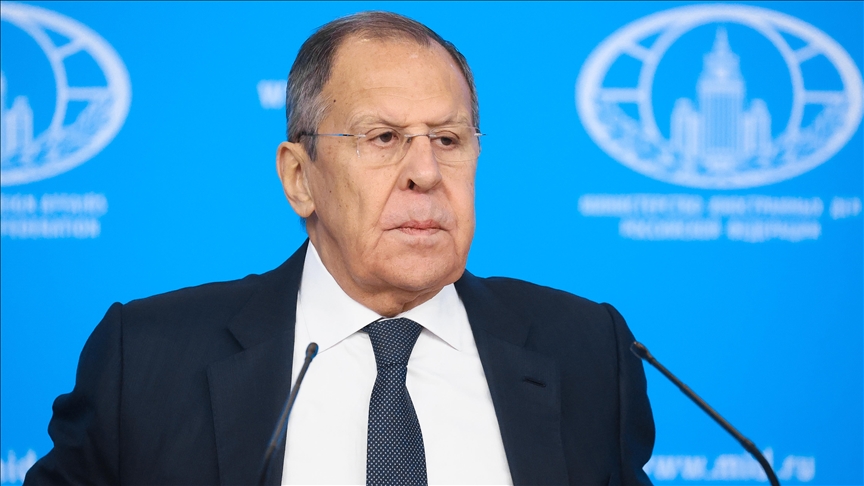Russia says US confirmed willingness to normalize relations in Riyadh meeting
Foreign Minister Lavrov says American delegation also stressed need to prevent conflicts from escalating into confrontation
 Russian Foreign Minister Sergei Lavrov
Russian Foreign Minister Sergei Lavrov
- Acknowledges challenges in relations with China, attributing them to Western sanctions
- Reaffirms position that NATO’s eastward expansion led to 'special military operation' in Ukraine
MOSCOW
Russian Foreign Minister Sergey Lavrov said US representatives at the Feb. 18 meeting in Riyadh expressed their desire to normalize relations with Russia.
Speaking to US bloggers in Moscow, Lavrov said the American delegation also stressed the need to prevent conflicts from escalating into confrontation, especially military conflict.
Dismissing claims that Russia is distancing itself from the East while improving US ties, Lavrov called them an "illusion," linking changes in Russian-US relations to the new administration, describing its course as a "return to normality."
Lavrov contrasted Republicans and Democrats, arguing that the latter aggressively impose the "LGBT agenda," which, in his view, pushed many voters toward Donald Trump. He noted that even Trump was unprepared for his first term in office but is now "fully ready."
At the Riyadh meeting, US Secretary of State Marco Rubio and other officials emphasized that Trump's foreign policy would prioritize American national interests "absolutely and without discussion." However, they acknowledged that other countries, including Russia, have their own interests, the minister said.
The US and Russia will never have fully aligned interests, but when they do, responsible politicians should turn them into practical, mutually beneficial projects, Lavrov said, adding that Russia shares this approach.
Lavrov on Gaza, Iran nuclear deal, Syria, relations with China
Asked about the situation in Palestine, Lavrov said he had seen reports suggesting that Israel plans to annex the West Bank by concentrating Palestinians into designated municipalities rather than expelling them.
He stressed that "municipalities" were not "camps," hinting unsettling parallels to Nazi Germany, where Jews were confined to specific areas and barred from living elsewhere, and now their plans on Palestinians are similar to that experience.
Lavrov said that while Palestine’s 1967 borders differ significantly from the original 1948 borders set under the UN Partition Plan, they remain far better than the current situation for Palestinians.
Regarding the Iran nuclear deal, he expressed Russia’s concern that the US seeks to condition its renewal on Iran proving it does not support groups in Iraq, Lebanon, Syria, and beyond, an expectation he described as unrealistic.
Lavrov acknowledged challenges in relations with China, attributing them to Western sanctions, as companies seek to avoid potential repercussions. He said restrictive measures have also delayed several promising logistics and infrastructure projects in Siberia, but emphasized Moscow and Beijing are in no rush.
The foreign minister added that Moscow is ready to consider Trump’s proposal for a trilateral meeting between the US, China, and Russia to discuss nuclear weapons and security.
"We would be open to any format which is based on mutual respect, equality, and no prejudged solutions. If our Chinese friends would be interested it would be their decision," he said.
Ukrainian settlement
Lavrov reaffirmed Russia’s position that NATO’s eastward expansion led to its "special military operation" in Ukraine.
He said if Germany and France had upheld their responsibilities as guarantors under the Minsk agreement, Russia would not have initiated combat.
The minister criticized former German Chancellor Angela Merkel and French President Francois Hollande, who, he said, admitted they never intended to implement the agreement but used it to buy time for more weapons.
Lavrov expressed skepticism about the US withdrawing from NATO, noting that Trump had never suggested such a possibility, only called for others to contribute their fair share to American defense.
The minister also argued that the EU is no longer just a peaceful economic project, as it now seeks its own military and has aligned itself closely with NATO.
He accused French President Emmanuel Macron of lying twice regarding Russia’s pressure on Ukraine, and questioned the logic of accepting peacekeepers from countries that have declared Russia an enemy.
The Russian top diplomat also expressed astonishment at Macron’s obsession with peacekeepers, questioning: "Why should we consent to a peacekeeping force, or even a peacekeeping group, made up of countries who declared us an enemy?"
Lavrov said that the head of German intelligence had recently said the war could not end before 2029, and asked: "Maybe they want to wait out Donald Trump?"
He emphasized that if Ukraine had honored the Minsk agreement, it would still have the 1991 borders, "minus Crimea and parts of Donbas."
"Every time they cheat, they lose. And the process continues," Lavrov said.
Ukraine on Tuesday expressed readiness to accept a US proposal for a 30-day ceasefire in its war with Russia, which continues since February 2022. The proposal, which still needs approval by Moscow, was announced in a joint statement after talks between US and Ukrainian officials in Saudi Arabia.








